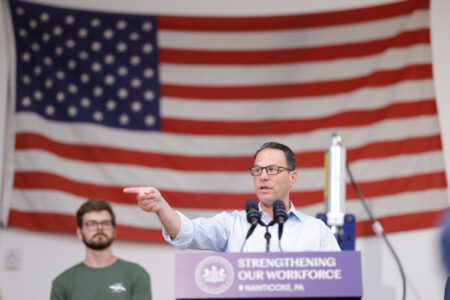Poll: State residents support Pennsylvania Promise

Sen. Vincent Hughes speaks at the Pennsylvania Capitol about PA Promise on June 25.
New polling shows broad support for a pilot program that would award grants to Pennsylvania students attending community colleges and four-year schools within the Pennsylvania State System of Higher Education, or PASSHE.
The Pennsylvania Promise program championed by Sen. Vincent Hughes, D-Philadelphia, has been floated in the General Assembly more than once without making it to the finish line.
Democrats presented the poll results in Harrisburg Wednesday, hopeful that the new data would make the issue undeniable for holdouts in the legislature.
“Sixty-nine percent of registered voters in Pennsylvania support the Pennsylvania Promise,” said Ken Mash, president of the Association of Pennsylvania State College and University Faculties, or APSCUF. “The pollster said you don’t get to see a number that pops like that very often.”
Rep. Jordan Harris, D-Philadelphia and Rep. Nate Davidson, D-Lemoyne, promised to co-sponsor an upcoming bill in the House that would reintroduce the program, which will offer more specifics when it comes to numbers like income thresholds and total program cost.
The current iteration of the Pennsylvania Promise proposed on the senator’s website would offer grants to students from families who earn $110,000 or less annually. Other thresholds have been floated in the past ranging up to $250,000 in total family income.
Community college students would receive a minimum of $1,000 per year toward tuition and fees, while those attending four-year colleges and universities would receive a minimum of $2,500 annually. It would also support grants for adults pursuing higher education toward new careers.
“Across Pennsylvania, Democrat and Republican, urban, rural and suburban, all support the Pennsylvania Promise,” said Harris. “There’s no need to argue about it anymore. The facts remain and the facts are clear-Pennsylvanians support the Pennsylvania Promise, and now it’s time for our legislature to do the same thing.”
Harris emphasized the need to draw more businesses to the state. One solution has been to improve the notorious red tape that slows development through permitting and deters workers through licensing. For Harris, having an educated workforce ready to work is another essential factor businesses consider.
The commonwealth has long sought incentives to meet demographic and economic challenges. Legislators have suggested programs like Pennsylvania Promise they believe could stop the slow bleed of the workforce toward neighboring states that offer higher wages and fewer obstacles.
“One of the most compelling reasons to support the Pennsylvania Promise is its potential to keep our brightest young minds right here in Pennsylvania,” said Davidson. “Right now many of our talented high school graduates are looking out of state for more affordable higher education options, and when they leave college, often they don’t come back. They take their skills, their potential, and their future contributions with them.”
Hughes noted that thirty other states have similar programs, including neighbors West Virginia, Maryland and New York. He emphasized the importance of giving “seasoned” students a chance to go back and complete college degrees that may have been derailed earlier in their lives.
“We made a promise to people. It’s time to fulfill the promise,” said Hughes.




